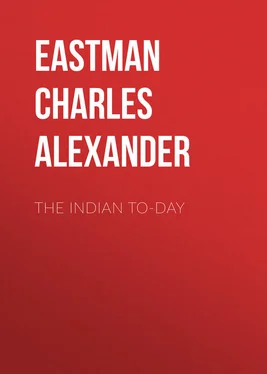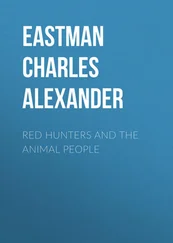Charles Eastman - The Indian To-day
Здесь есть возможность читать онлайн «Charles Eastman - The Indian To-day» — ознакомительный отрывок электронной книги совершенно бесплатно, а после прочтения отрывка купить полную версию. В некоторых случаях можно слушать аудио, скачать через торрент в формате fb2 и присутствует краткое содержание. Жанр: foreign_antique, foreign_prose, на английском языке. Описание произведения, (предисловие) а так же отзывы посетителей доступны на портале библиотеки ЛибКат.
- Название:The Indian To-day
- Автор:
- Жанр:
- Год:неизвестен
- ISBN:нет данных
- Рейтинг книги:3 / 5. Голосов: 1
-
Избранное:Добавить в избранное
- Отзывы:
-
Ваша оценка:
- 60
- 1
- 2
- 3
- 4
- 5
The Indian To-day: краткое содержание, описание и аннотация
Предлагаем к чтению аннотацию, описание, краткое содержание или предисловие (зависит от того, что написал сам автор книги «The Indian To-day»). Если вы не нашли необходимую информацию о книге — напишите в комментариях, мы постараемся отыскать её.
The Indian To-day — читать онлайн ознакомительный отрывок
Ниже представлен текст книги, разбитый по страницам. Система сохранения места последней прочитанной страницы, позволяет с удобством читать онлайн бесплатно книгу «The Indian To-day», без необходимости каждый раз заново искать на чём Вы остановились. Поставьте закладку, и сможете в любой момент перейти на страницу, на которой закончили чтение.
Интервал:
Закладка:
It must always be borne in mind that the first effect of association with the more advanced race was not improvement but degeneracy. I have no wish to discredit the statements of the early explorers, including the Jesuit priests; but it is evident that in the zeal of the latter to gain honor for their society for saving the souls of the natives it was almost necessary to represent them as godless and murderous savages – otherwise there would be no one to convert! Of course they were not angels, but I think I have made it clear that they were a God-fearing, clean, and honorable people before the coming of the white man.
The transition from their natural life to the artificial life of civilization has been very gradual in most cases, until the last fifty years, when the changes have been more rapid. Those who were first affected were the so-called "Five Civilized Nations" of the South, and the "Six Nations" of New York State, together with some of the now extinct bands in New England, who came in close touch with the early colonists. Both politically and commercially, they played an important part in the settlement of America. Their services as scouts, guides, and allies were of great value in the early history of this country, and down to recent years. Many received no salary, and some even furnished their own horses. It is a remarkable fact that there is not one instance on record of a scout betraying the cause he served, even though used against his own tribe and his own relatives. Once his honor is pledged to a public trust, he must sustain it at any cost.
In many cases those tribes which declared allegiance to the French, the English, or the Americans, were in their turn the means of bringing a neighboring tribe into subjection. Thus began a new era in the history of the Indian, inaugurating a kind of warfare that was cruel, relentless, and demoralizing, since it was based upon the desire to conquer and to despoil the conquered of his possessions – a motive unknown to the primitive American.
To be sure the new weapons were more efficient, and therefore more deadly; the new clothing was gayer, but less perfectly adapted to the purposes of primitive life. Indeed, the buckskin clothing and moccasins of the Indian were very generally adopted by the white frontiersman. On the other hand, his spiritual and moral loss was great. He who listened to the preaching of the missionaries came to believe that the white man alone has a real God, and that the things he had hitherto held sacred are inventions of the devil. This undermined the foundations of his philosophy, and very often without substituting for it the Christian philosophy, which the inconsistency of its advocates, rather than any innate quality, made it difficult for him to accept or understand.
A few did, in good faith, accept the white man's God. The black-robed preacher was like the Indian himself in seeking no soft things, and as he followed the fortunes of the tribes in the wilderness, the tribesmen learned to trust and to love him. Then came other missionaries who had houses to sleep in, and gardens planted, and who hesitated to sleep in the Indian's wigwam or eat of his wild meat, but for the most part held themselves aloof and urged their own dress and ways upon their converts. These, too, had their following in due time. But in the main it is true that while the Indian eagerly sought guns and gunpowder, knives and whiskey, a few articles of dress, and, later, horses, he did not of himself desire the white man's food, his houses, his books, his government, or his religion.
The two great "civilizers," after all, were whiskey and gunpowder, and from the hour the red man accepted these he had in reality sold his birthright, and all unconsciously consented to his own ruin. Immediately his manhood began to crumble. A few chiefs undertook to copy some of the European ways, on the strength of treaty recognition. The medals and parchments received at such times were handed down from father to son, and the sons often disputed as to who should succeed the father, ignoring the rule of seniority and refusing to submit to the election of the council. There were instances during the nineteenth century in the vicinity of Chicago, Prairie du Chien, Saint Paul, and Kansas City, where several brothers quarrelled and were in turn murdered in drunken rows. There was also trouble when the United States undertook to appoint a head chief without the consent of the tribe. Chief Hole-in-the-Day of the Ojibways and Spotted Tail of the Brule Sioux were both killed by tribesmen for breaking the rule of their respective tribes and accepting favors from the Government.
Intermarriages were not common among the different tribes in the old days, and still less so between Indians and Caucasians. The earlier intermarriages were with the higher class of Europeans: officers, noblemen, etc., and many of the offspring of these unions were highly esteemed, some becoming chiefs. At this period the natives preferred their own marriage customs, which was convenient for the white officers who were thus enabled to desert their wives and children when they chose, and often did so, quite as if there were no binding obligation. Later, when unions between the lower class of both races became common, the Sioux refused to recognize their half-breeds as members of the tribe, and a certain territory was set apart for them. These half-breeds disposed of their land to the Government, and took instead certificates entitling them to locate upon the public domain. Some thirty years afterward they returned to their mother tribe and were allowed full rights as members of their respective bands.
Except among the French Canadians, in no section has there been such a general intermingling of the blood of the two races as in the Southern States. The Virginia legislature early recognized intermarriages between whites and Indians, and from the time of Pocahontas to this day some of the best families have married among Cherokees, Chickasaws, and Choctaws, and are proud of the infusion of aboriginal blood. Among the "Five Civilized Tribes" of Oklahoma the Indian blood is distinguishable only in a minority of those who call themselves "Indians."
This transition period has been a time of stress and suffering for my people. Once they had departed from the broad democracy and pure idealism of their prime, and undertaken to enter upon the world-game of competition, their rudder was unshipped, their compass lost, and the whirlwind and tempest of materialism and love of conquest tossed them to and fro like leaves in the wind.
"You are a child," said the white man in effect to the simple and credulous native. "You cannot make or invent anything. We have the only God, and he has given us authority to teach and to govern all the peoples of the earth. In proof of this we have His Book, a supernatural guide, every word of which is true and binding. We are a superior race – a chosen people. We have a heaven fenced in with golden gates from all pagans and unbelievers, and a hell where the souls of such are tortured eternally. We are honorable, truthful, refined, religious, peaceful; we hate cruelty and injustice; our business is to educate, Christianize, and protect the rights and property of the weak and the uncivilized."
This sort of talk had its effect. Let us see what followed.
CHAPTER II
THE HOW AND THE WHY OF INDIAN WARS
I have tried to set forth the character and motives of the primitive Indian as they were affected by contact with civilization. In a word, demoralization was gradual but certain, culminating in the final loss of his freedom and confinement to the reservation under most depressing conditions. It must be borne in mind that there has been scarcely any genuine wild life among us for the past thirty-five years. Sitting Bull's band of Sioux were the last real hostiles of their tribe to surrender, in 1880, and Geronimo's Apaches followed in 1886.
Читать дальшеИнтервал:
Закладка:
Похожие книги на «The Indian To-day»
Представляем Вашему вниманию похожие книги на «The Indian To-day» списком для выбора. Мы отобрали схожую по названию и смыслу литературу в надежде предоставить читателям больше вариантов отыскать новые, интересные, ещё непрочитанные произведения.
Обсуждение, отзывы о книге «The Indian To-day» и просто собственные мнения читателей. Оставьте ваши комментарии, напишите, что Вы думаете о произведении, его смысле или главных героях. Укажите что конкретно понравилось, а что нет, и почему Вы так считаете.

![О Генри - Бабье лето Джонсона Сухого Лога [The Indian Summer of Dry Valley, Johnson]](/books/407344/o-genri-babe-leto-dzhonsona-suhogo-loga-the-india-thumb.webp)










